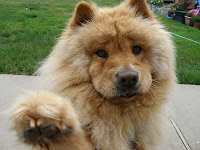

Journal compilation © 2009 Blackwell Verlag
Canine Reconciliation and Third-Party-Initiated Postconflict Affiliation: Do Peacemaking Social Mechanisms in Dogs Rival Those of Higher Primates?
ABSTRACT - Conflicts over food, access to mates, or other limited resources can sometimes escalate into aggression. In species that form social groups, these aggressive conflicts can jeopardize the benefits of group living, such as enhanced access to valued resources, necessitating the development of behavioural mechanisms that either mitigate conflicts, prevent aggressive escalation or resolve disputes. Two important mechanisms for managing the effects of disputes involve postconflict (PC) affiliative behaviour, either between the former opponents (called 'reconciliation') or between one opponent and a third party. Even though numerous studies have tested reconciliatory and third-party affiliation tendencies in primates, for non-primate animals little systematic data are available. We performed behavioural observations on three groups of captive domestic dogs (Canis familiaris) and used a PC/MC method to test the existence of reconciliation and third-party affiliation in this species. The results of this study clearly indicate that both reconciliation and third-party PC interactions are present in the domestic dog, and form important social mechanisms of the domestic dog. Furthermore, familiar individuals showed a significantly higher proportion of reconciled conflicts than did unfamiliar individuals, and also displayed fewer conflicts. Finally, we show that most of the third-party affiliations involve the victim of a conflict and that victim-directed affiliation outweighs victim-initiated third-party affiliation in these PC interactions.
Sem comentários:
Enviar um comentário